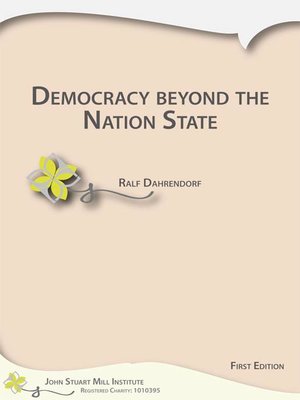
Sign up to save your library
With an OverDrive account, you can save your favorite libraries for at-a-glance information about availability. Find out more about OverDrive accounts.
Find this title in Libby, the library reading app by OverDrive.



Search for a digital library with this title
Title found at these libraries:
| Library Name | Distance |
|---|---|
| Loading... |
Democracy has arguably become a debased word in the language of politics. Not only was it used to label nearly the opposite of its original intent when communist dictatorships called themselves 'people's democracies', but more recently the use of the word has been stretched so far as to rob it of all definition. When twenty-three hereditary Liberal Democrat peers elect three from their midst to remain in the 'transitional' House of Lords, the winners are described as 'democratically elected'. It is an unfortunate mistake to confuse elections - all and any elections – with political democracy. On the other hand, when 'democracy' is brought to formerly authoritarian parts of the world, the term is used to imply the whole gamut of modern values - liberty, certainly; equality, which Tocqueville first called, democracy, and more recently, fraternity too; Jürgen Habermas's unconstrained discourse or even Amitai Etzioni's communitarian love world. Democracy becomes a synonym for the good society, and that too is an unfortunate mistake. In my argument about democracy and the nation-state I want to avoid such mistakes and use, with the help of Karl Popper and John Stuart Mill, clearly defined terminology. The simplest definition of democracy is that by KarlPopper: a constitution which makes it possible to get rid of government without bloodshed. Perhaps this definition is more laconic than simple because its implications are actually quite complex. Popper's one big idea, first developed in the Logic of Scientific Discovery and later applied to the Open Society, was that while we are striving for truth and for the good society, we can never know for sure whether we have achieved the end. Nobody can know, however, wise or powerful they may be. It is therefore above all important to make sure that no-one can turn his or her approach into dogma, like the Prolemean view of the world, or the despotism of monarchs and popes who defended it. Galileo's eppur si muove - and yet the earth is moving - marks real progress by revealing the fallibility of accepted wisdom. Not only progress but liberty itself depends on the constitutional possibility and occasional reality of falsification, of the replacement of a false theory or a bad government by a better one ...







